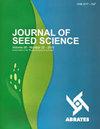Protein profile in arabica coffee seeds in electrophoresis gel: importance of freeze-drying
IF 1.2
4区 农林科学
Q3 AGRONOMY
引用次数: 1
Abstract
Abstract: Coffee seeds are sensitive to desiccation and are used or stored with different moisture content values, which may affect the results of quality assessment. The aim of this study was to evaluate the changes in protein profile in electrophoresis gel in coffee seeds with different moisture content values under freeze-drying and without freeze-drying. Two lots of arabica coffee seeds were used, one of newly-harvested seeds and another of stored seeds. The seeds were dried to the moisture content values of 12, 15, 20, 25, 30, 35, and 40%. The physiological quality of the seeds was assessed through the germination test, electrical conductivity, and the profiles of the enzymes SOD, CAT, PO, GOT, MDH, and EST and of heat-resistant proteins. In general, there is an effect on expression of these enzymes in accordance with the presence of free water in the seeds. Moist seeds have little to no enzyme expression. The freeze-drying process allows preservation of coffee seed quality and does not change the functionality of the enzymes studied. The isoenzyme profiles of the antioxidant process in arabica coffee seeds are affected by the initial moisture content of the seeds. The freeze-drying process of the seeds ensures greater sensitivity in detection of the expression of these isoenzymes.电泳凝胶中阿拉比卡咖啡种子的蛋白质谱:冷冻干燥的重要性
摘要/ Abstract摘要:咖啡种子对干燥非常敏感,在不同的含水量值下使用或储存,可能会影响品质评价的结果。研究了不同水分含量的咖啡种子在冷冻干燥和不冷冻干燥条件下电泳凝胶蛋白谱的变化。使用了两批阿拉比卡咖啡种子,一批是新收获的种子,另一批是储存的种子。将种子干燥至含水量分别为12、15、20、25、30、35和40%。通过发芽试验、电导率、SOD、CAT、PO、GOT、MDH、EST酶谱和耐热蛋白谱评价种子的生理品质。一般来说,这些酶的表达与种子中自由水分的存在有关。湿润的种子几乎没有酶表达。冷冻干燥过程可以保存咖啡种子的品质,并且不会改变所研究的酶的功能。阿拉比卡咖啡种子抗氧化过程的同工酶谱受种子初始含水量的影响。种子的冷冻干燥过程确保了检测这些同工酶表达的更高灵敏度。
本文章由计算机程序翻译,如有差异,请以英文原文为准。
求助全文
约1分钟内获得全文
求助全文
来源期刊

Journal of Seed Science
Agricultural and Biological Sciences-Agronomy and Crop Science
CiteScore
2.00
自引率
30.00%
发文量
28
审稿时长
12 weeks
期刊介绍:
From 2017 the Journal of Seed Science (JSS) will circulate online version only.
Original scientific studies and communications, not yet published or submitted to another journal for publication and written in Portuguese or English, will be accepted for publication. For manuscripts submitted in English, the authors should provide an adequated version.
The SCIENTIFIC COMMUNICATION is a category of scientific manuscript which describes a technique, an equipment, new species or observations and surveys of limited results. It has the same scientific rigor as the “Scientific Articles” and the same value as a publication. The classification of a manuscript as a SCIENTIFIC COMMUNICATION is based on its content and scientific merit but it can be a preliminary study, simple and not definitive on a certain subject, with publication justified by its uniqueness and contribution to the area.
The Editorial Board of the JSS may invite leading authors of recognized reputation to compose specific Review Articles covering topics of their specialization that will convey to the scientific community the state-of-the-art knowledge related to the specific theme.
 求助内容:
求助内容: 应助结果提醒方式:
应助结果提醒方式:


